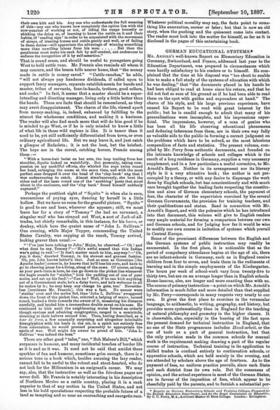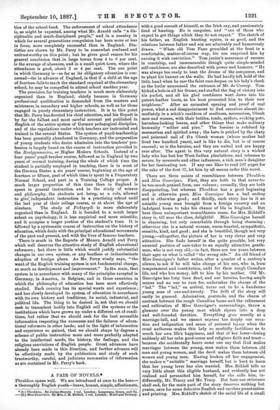GERMAN EDUCATIONAL SYSTEMS.*
Ma. Ammtm's well-known Report on Elementary Education in Germany, Switzerland, and France, addressed last year to the Education Department, was prepared in circumstances which were hardly satisfactory to his readers or to himself. He com- plained that the time at his disposal was " too short to enable him to make a full study of the systems of education with which he was dealing," that "the documents placed in his hands he had been obliged to read at home since his return, and that he did not feel so sure of his ground as if he had been able to read them on the spot with guides and expounders at hand." The charm of his style, and his large previous experience, have caused his Report to be read with great interest by the public ; but he is candid enough to admit that many of his generalisations were incomplete, and his impressions super- ficial. The impressions, however, of a man of genius who has been all his life observing educational phenomena and deducing inferences from them, are in their own way fully as valuable aids to the public in forming a correct judgment on the problems which have to be solved, as the most laborious compendium of facts and statistics. The present volume, com- piled by Mr. Perry from authentic documents, and founded on the intimate knowledge of schools and colleges which is the result of a long residence in Germany, supplies a very necessary supplement, and in a few particulars a useful corrective, to Mr. Arnold's Report. Neither in its arrangement nor its literary style is it a very attractive book ; the author is not pre- occupied by a theory, or with any desire to disparage the work done by English schools, but has conscientiously and with much care brought together the leading facts respecting the constitu- tion and aims of German elementary schools, the payment of fees, the character of the supervision exercised by the several German Governments, the provision for training teachers, and their qualifications and statue. Read in connection with Mr. Arnold's Report, and with the polemics which he has introduced into that document, this volume will give to English readers very ample material for forming a comparison between our own and German schools, and for judging how far it would be wise to modify our own course in imitation of systems which prevail in Central Europe.
Some of the prominent differences between the English and the German systems of public instruction may readily be enumerated. In the first place, it is noticeable that as the period of compulsory attendance begins at the age of six, there are no infant-schools in Germany, such as in England receive children from four to seven, and train them in the rudiments of learning and in the simple employments of the Kindergarten. The hours per week of school-work vary from twenty-five to thirty-two, but are on an average longer than in English schools Home-lessons, also, are longer and more exacting than with us. The course of primary instruction—a point on which Mr. Arnold's information is much faller and more detailed than that supplied by Mr. Perry—corresponds in many respects very nearly to our own. It gives the first place to exercises in the vernacular language, to arithmetic, to writing, geography, and history, but provides more systematically than in England for the teaching of natural philosophy and geometry in the higher classes. It is observable, also, especially in the bearing of the fact upon the present demand for technical instrnction in England, that no one of the State programmes includes Hand-arbeit, or the use of tools as a part of general instruction, but that the only provision made in the common schools for manual work is the requirement making drawing a part of the regular course of instruction. Technical training in its application to skilled trades is confined entirely to continuation schools, or apprentice schools, which are held mainly in the evening, and are attended by scholars above the age of fourteen. As to the payment of fees, no uniform practice prevails, since each State and each district fixes its own role. Bat the consensus of opinion, and the actual experience in most of the German States, are in favour of the imposition of fees, which appear to be cheerfully paid by the parents, and to furnish a substantial por- • Reports on Gorman Elementary Schools and T,oining Colleges, Prepared for the English Education Departmont, and for the Royal Commission on Education. By 0. 0. Perry, KA., desnstant.Master at Eton College. London llieingtons.
tion of the school-fund. The enforcement of school attendance is, as might be expected, among what Mr. Arnold calls " a dis- ciplinable and much-disciplined people," and in a country in which for several generations compulsion has been more or less in force, more completely successful than in England. Sta- tistics are shown by Mr. Perry to be somewhat confused and untrustworthy on this point ; but he gives good reason for his general conclusion that in large towns from 4 to 6 per cent. is the average of absences, and in a small quiet town, where the attendance is good, about 3 or 4 per cent. The one point in which Germany is—so far as its obligatory education is con. corned—far in advance of England, is that if a child at the age of fourteen fails to reach the standard required at the elementary school, he may be compelled to attend school another year.
The provision for training teachers is much more elaborately organised than in England, chiefly because in Germany professional qualification is demanded from the masters and mistresses in secondary and higher schools, as well as for those engaged in purely elementary instruction. It is to this point that Mr. Perry has devoted his chief attention, and his Report is by far the fullest and most careful account yet published in English of the entire system of German pedagogical discipline, and of the regulations under which teachers are instructed and trained in the several States. The system of pupil.teachership has been generally abandoned in Germany, and the preparation of young students who desire admission into the teachers' pro- fession is largely based on the course of instruction provided in the Realgymnasien, or Higher Modern Schools. Instead of a four years' pupil-teacher course, followed as in England by two years of normal training, daring the whole of which time the student is partially employed in teaching, there is in most of the German States a six years' course, beginning at the age of fourteen or fifteen, part of which time is spent in a Preparatory Normal School, and part in a Training College proper. A much larger proportion of this time than in England is spent in general instruction and in the study of science and philosophy, the students not being, as a role, allowed to give: independent instruction in a practising school until the last year of their college course, or at about the age of nineteen. The study of Pildagogik is more elaborately organised than in England. It is founded to a much larger extant on psychology, it is less empirical and more scientific, and it occupies a larger portion of the student's time. It is followed by a systematic coarse of instruction on the history of education, which deals with the principal educational movements of the past and present, and with the lives of famous teachers.
There is much in the Reports of Messrs. Arnold and Perry which well deserves the attentive study of English educational reformers ; but there is little which would justify substantial changes in our own system, or any heedless or indiscriminate adoption of foreign plans. As Mr. Perry wisely says, "the want of the English training system is not fundamental change, so much as development and improvement" In the main, that system is in accordance with many of the principles accepted in Germany, in America, in Belgium, and in those countries in which the philosophy of education has been most effectively studied. Each country has its special wants and experience; and has slowly developed its system of education in accordance with its own history and traditions, its social, industrial, and political life. The thing to be desired is, not that we should eeek to transplant bodily into English soil the systems or the institutions which have grown up under a different set of condi- tions, but rather that we should seek for the best accessible information respecting the successes and the failures of educa- tional reformers in other lands; and in the light of information and experience so gained, that we should shape by degrees a scheme of public instruction more and more perfectly adapted to the intellectual needs, the history, the feelings, and the religious convictions of English people. Great advances have already been made in this direction, and further advance will be effectively made by the publication and study of such trustworthy, careful, and judicious summaries of information as are contained in Mr. Perry's book.



































 Previous page
Previous page